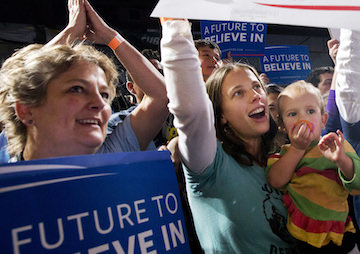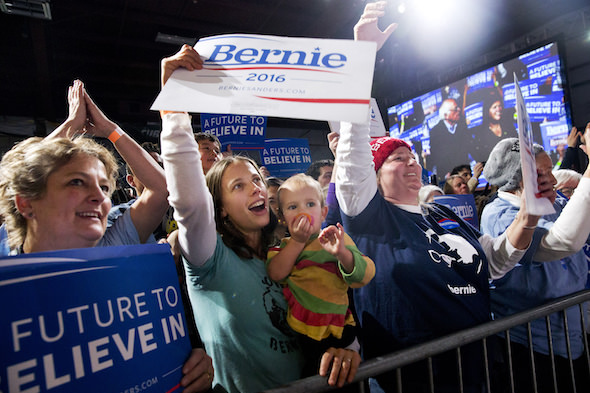Opinion: Don’t Cry About Super Tuesday—Bernie Sanders Is Winning the Future
At least one pundit on the left had the decency, fortitude and intellectual honesty not to smother the dreams of millions of Americans—many of them young and/or struggling under a mountain of debt—by declaring Hillary Clinton the inevitable winner of the Democratic nomination after her victories on Super Tuesday.

Supporters cheer for Sanders on Super Tuesday. (Jacquelyn Martin / AP)
At least one pundit on the left had the decency, fortitude and intellectual honesty not to smother the dreams of millions of Americans—many of them young and/or struggling under a mountain of debt—by declaring Hillary Clinton the inevitable winner of the Democratic nomination after her victories on Super Tuesday.
The morning after the results rolled in, The Guardian’s Richard Wolffe dismissively caricatured Sanders’ handling of his Super Tuesday performance before huffing that it “may be premature to expect Sanders to concede to reality.” At Mother Jones, Tim Murphy ended an article headlined “Bernie Sanders Is in a Whole Lot of Trouble” by declaring that “the math” in the contests ahead “is looking pretty grim.”
Progressives in search of reasons for what the early 20th century Italian thinker Antonio Gramsci called “optimism of the will” were left to stumble upon a measured review of the larger context of the night’s events by In These Times editor and publisher Joel Bleifuss.
“Judging from Super Tuesday’s results, Sen. Bernie Sanders has a long row to hoe if he is going to overtake Hillary Clinton and become the Democratic nominee,” Bleifuss began. “By and large, the margins of her victories were larger than the margins of his. And as In These Times Deputy Publisher Christopher Hass reported last week, it is in the size of these margins that the Democratic standard bearer will be determined.
“But the race for the Democratic nomination is not only a contest between Hillary Clinton and Bernie Sanders. It is also the venue for competing ideas about how social change is made, in which two visions for the future have been offered.”
Look at how the debate over healthcare has played out. Sanders is an unabashed supporter of getting insurance corporations out of the healthcare business and establishing a single-payer, Medicare-for-all system. Clinton has campaigned to defend the Obamacare status quo, and tinker about the edges. Ditto with banking. Sanders promises he will break up banks that are too big to fail. Clinton wants to—well, she says she will hold Wall Street accountable and reduce risks, but we don’t exactly know what her agenda is, since she has refused to release the texts of speeches she gave to the bankers who have funded her. As for making college affordable, Sanders wants to provide free tuition for students who attend state institutions. Clinton wants to make community colleges free and reduce costs at public universities. The list goes on, but you get the picture. The choice is between radical change and incremental reform.
And that’s reform that 26 million Americans who still lack reliable access to health care six years after the passage of President Obama’s landmark health insurance law would be justified in seeing as no reform at all.
“Again and again,” Bleifuss continued, we get the same “measured caution” from Clinton. “Dreams are for the future. … Enjoy the feast. Half a loaf is better than none.”
True to the interests of his constituents, Sanders “is having no truck with such a meager meal.” As the senator put it in a speech in Fort Collins, Colo., on Sunday:
I believe that if you start your campaign and run on a platform calling for a full loaf, at worst you’re gonna get a half loaf. If you start your campaign talking about a need for a half loaf, you’re going to get crumbs. And the American people today do not want, do not need crumbs. They need the whole loaf.
With Clinton measurably closer to the nomination, “it looks like we’re sitting down to a pretty lean victors banquet,” Bleifuss continued. But if Sanders does lose the nomination, he asks, “[I]n the long-term, who is the real winner? Who has put ideas on the table that herald a future that transcends the status quo? As he has done before, on Super Tuesday, in state after state, Sanders won a majority of Democratic voters under the age of 30. Clinton may yet win the nomination, but the future of the party belongs to Sanders.”
The young people who make up a significant portion of Sanders’ movement “are not clueless dreamers. The harsh realities of employment precarity, debt, low wages, inequality, climate change, etc., have forced young Americans to reassess their circumstances in a cold, harsh light.”
If life in America is basically peachy keen, then the small-bore reforms proposed by Clinton and the neoliberal technocrats who helm the Democratic Party make a lot of sense.
If, on the other hand, the status quo is intolerable—as it is for millions of Americans—then what Sanders calls “political revolution” becomes a moral imperative.
Clinton and Sanders offered America’s millennials two futures. They made their choice.
Tom Cahill at the similarly out-of-the-way U.S. Uncut gave readers further cause to resist the seductions of defeatism by pointing out that “Sanders is largely holding up to the bar set by nationally-respected pollster Nate Silver in states needed to win the Democratic nomination.”
While Sanders narrowly lost Massachusetts to Clinton by 2 points on Super Tuesday, he won Minnesota, Vermont, Colorado, and Oklahoma by larger-than-expected margins, and he faces a much more favorable electorate in states voting after March 15. If Sanders stays within 150 delegates by that benchmark, he can potentially narrow Clinton’s lead in the spring and overtake her in the summer as Sanders-favorable coastal states take to the polls.
Hillary Clinton and her surrogates in the press hope Sanders’ early losses will demoralize his supporters. But Sanders has defied the odds from the start. The nomination process is far from over and he has promised to fight to the finish. If you like what he’s offering, don’t give up on him—because he’s not giving up on you.
Independent journalism is under threat and overshadowed by heavily funded mainstream media.
You can help level the playing field. Become a member.
Your tax-deductible contribution keeps us digging beneath the headlines to give you thought-provoking, investigative reporting and analysis that unearths what's really happening- without compromise.
Give today to support our courageous, independent journalists.






You need to be a supporter to comment.
There are currently no responses to this article.
Be the first to respond.